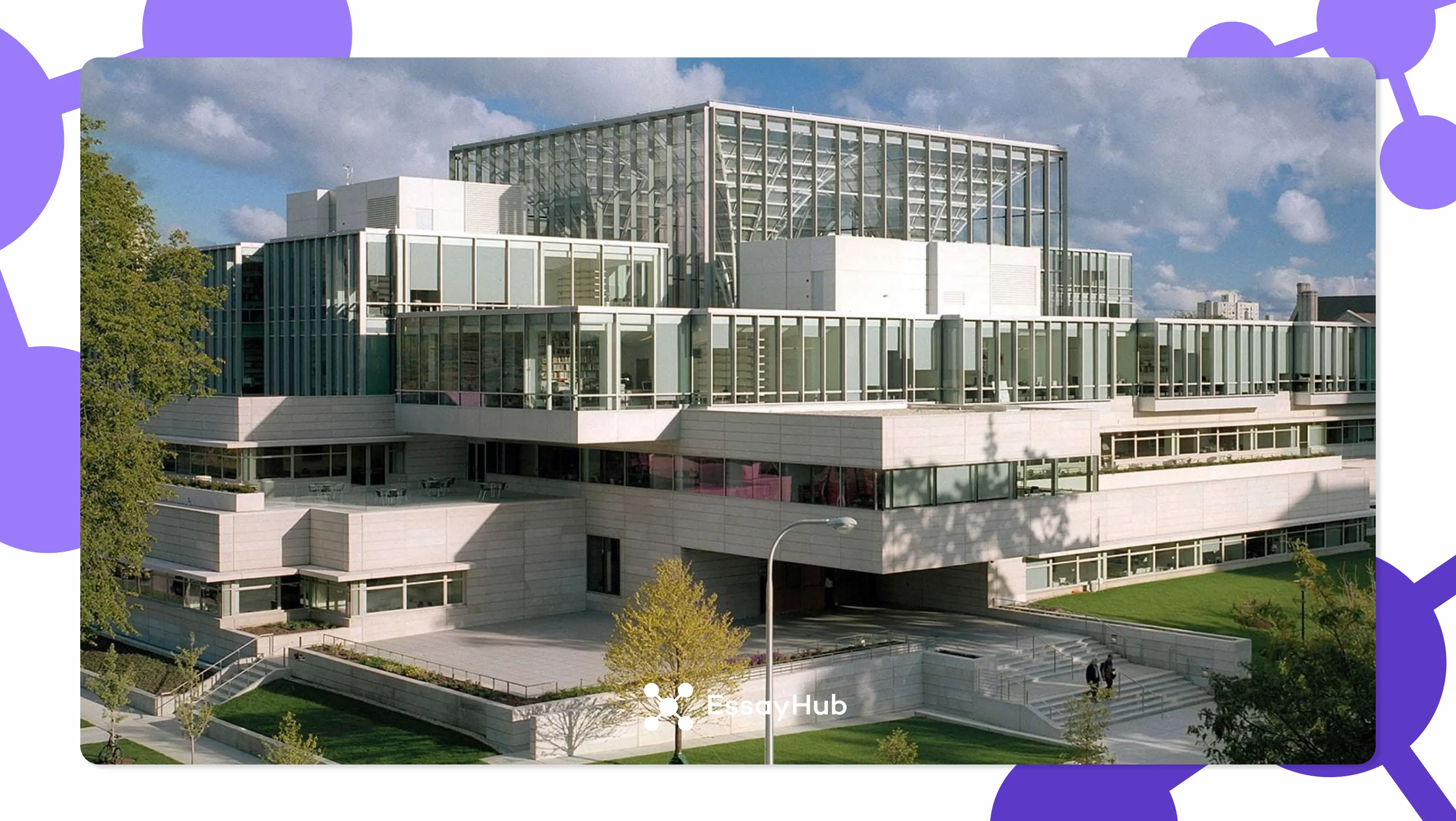The best business schools in the US earn attention not only because of tradition but because rankings confirm their ability to prepare students across finance, management, economics, and communications.
Let’s ask a simple question: what should matter most in a ranking for your future career? We’ll break that down with real analysis, practical tips, and context.
EssayHub’s purpose with this article is to help students browse the latest insights when the search feels overwhelming and offer support with the ‘write my essays’ service for both undergraduate and graduate students.
US Business School Rankings in 2025

Harvard Business School
Harvard’s MBA, one of the top business schools, is built around the case method, which means students spend most days debating real decisions instead of just reading theory.
More than 500 cases come up across two years, and those conversations often include guest insights from leaders who actually lived them. Add to that the tight ‘section’ system of about 90 classmates, and you get an experience that’s both rigorous and personal.
Benefits:
- World-renowned case method develops real-world decision-making skills.
- Strong alumni network with 90,000+ members across 170 countries.
- Access to top-tier recruiters and leadership-focused curriculum.


Stanford GSB
Getting into Stanford is difficult, but for those lucky enough to make it, the experience is hard to beat. The program combines entrepreneurship, reflective leadership, and a whole lot of learning by doing.
On the doorstep of Silicon Valley, students can quickly transform ideas into actual ventures, where they are mentored by investors and founders who know how to embrace both risks and opportunities.
Benefits:
- Focus on innovation and entrepreneurship, especially in Silicon Valley.
- Personalized “Leadership Labs” and global study experiences.
- Tight-knit community with a strong collaborative culture.


UPenn Wharton
Wharton is the go-to name in finance, but its reach is wider than most assume. The school balances analytics, healthcare, tech, and social impact with one of the broadest MBA curricula anywhere.
Add in a San Francisco campus and an alumni network that stretches worldwide, and students find options across industries instead of being limited to Wall Street.
Benefits:
- Deep strength in finance and analytics with 19 majors.
- Extensive global learning through Wharton Global Modular Courses.
- Powerful alumni network and high post-MBA salaries worldwide.


Northwestern Kellogg
Kellogg puts teamwork at the heart of its identity. While some programs lean on competition, Kellogg stresses collaboration in nearly every project.
The typical student wants to go on to consulting, marketing, or healthcare. The real learning here is a product of combining leadership and listening. The culture is both aspirational and approachable.
Benefits:
- Known for teamwork and leadership development.
- Offers a wide range of joint degrees (JD-MBA, MMM).
- Top-ranked programs in marketing and management.


University of Chicago Booth
Booth is more flexible than students expect. While its curriculum allows for considerable self-design, the learning style weaves together an important discipline in finance, entrepreneurship, and economics, depending on your career goals.
Booth is very quantitative; however, it does have strong leadership programming on the business side through its LEAD program. The location means students can connect with consulting firms and employers in real time.
Benefits:
- Pioneering focus on data-driven and analytical thinking.
- Flexible curriculum that allows full academic customization.
- Access to Nobel Prize-winning faculty in economics and finance.


Columbia Business School
Columbia thrives in the middle of New York City. Students learn business strategy in the classroom and then enter internships or projects with Wall Street firms, consulting groups, and media companies right outside the door.
The program’s Master Classes bring real executives into the room, making it a direct bridge between study and practice.
Benefits:
- Strategic New York City location offers direct industry access.
- Strong focus on finance, consulting, and entrepreneurship.
- Flexible start dates (January and August intakes).


MIT Sloan
Sloan combines management training with a deep focus on data and technology. Students join Action Learning labs where teams solve problems for real companies.
Most of the students aim for consulting, product management, or start-ups, and the Cambridge location helps them maintain ties to Boston's innovation and research base.
Benefits:
- Combines innovation and technology with business leadership.
- Known for Action Learning Labs that solve real company problems.
- Deep connection to MIT’s tech and startup ecosystem.


Dartmouth Tuck
Tuck's classes are small, and the size creates a unique sense of community. Students live and learn in Hanover, which contributes to small class sizes and deep alumni connections.
The program is known for general management, everyday leadership development and has a reputation among graduates who are unusually loyal to one another as alumni.
Benefits:
- Intimate class size fosters close mentorship and collaboration.
- Renowned for leadership development and community culture.
- Exceptional career support with high placement rates.


Berkeley Haas
Haas takes students somewhere beyond performance to principles of leadership. The Bay Area location gives MBAs direct connections to tech firms, venture capital, and social impact organizations, which makes product management a popular choice among graduates.
The culture at Haas is open and collaborative with alumni noting the continuity in their post-graduate lives.
Benefits:
- Strong emphasis on innovation, ethics, and sustainability.
- Located in the Bay Area, close to major tech firms and startups.
- Known for its Defining Leadership Principles.


UVA Darden
Darden is built on case-based learning, with students expected to come to class ready to lead discussions. The program has a strong reputation for developing communication skills and decision-making confidence.
Its Charlottesville location builds a close student community, and career paths often include consulting, finance, and increasingly tech roles.
If you’re working on a business proposal for class, connect with one of our professional business proposal writers.
Benefits:
- Case-based curriculum that builds critical thinking and leadership.
- Highly regarded faculty and student engagement culture.
- Excellent consulting and general management career outcomes.

.webp)
Yale School of Management (Yale SOM)
Yale SOM stands out for linking business with policy and public service. The integrated curriculum pushes students to weigh social impact alongside profit, giving graduates flexibility to move into consulting, government, nonprofits, or traditional corporate roles.
Many see it as a program for students who want a broader view of leadership.
Benefits:
- Integrates business and societal impact into its mission.
- Global integrated curriculum across disciplines.
- Strong ties with Yale University’s broader network.


Duke Fuqua
Fuqua builds its reputation on collaboration. The ‘Team Fuqua’ culture runs through projects, clubs, and even recruiting, making the program attractive to students headed for consulting and healthcare.
Global residencies add another layer, allowing MBAs to study business abroad while building experience in international markets.
Benefits:
- Focus on team-driven leadership and collaboration.
- Broad array of global study options and dual degrees.
- Known for its strong healthcare and consulting programs.


University of Michigan Ross
Ross heavily relies on real-world learning. The MAP project places students inside companies, where they tackle actual business problems, not just classroom exercises.
Those projects often lead to internships or full-time roles. Strong recruiting ties across the Midwest give Ross grads reliable access to consulting, tech, and finance careers.
Benefits:
- Real-world learning through MAP (Multidisciplinary Action Projects).
- Strong alumni network and leadership-focused curriculum.
- Excellent reputation in operations and strategy.


University of Texas, Austin McCombs
McCombs thrives on Austin’s mix of startups, tech giants, and energy firms. Students get hands-on experience through projects with local companies, and the city’s growth means new opportunities appear constantly.
Alumni support across Texas is strong, helping graduates land consulting, finance, and leadership roles across industries.
Benefits:
- Strong ties to tech and energy sectors in Austin’s economy.
- Affordable compared to peer schools with excellent ROI.
- Collaborative community emphasizing innovation and inclusion.


Cornell University, Johnson
Johnson’s smaller community makes it easy for students to know classmates and professors on a personal level.
The Tech MBA in New York City attracts those aiming at product management and tech, while the Ithaca campus offers a classic MBA environment. Both tracks come with solid career support and alumni access.
Benefits:
- Immersive semester-long industry programs (finance, tech, consulting).
- Part of Cornell’s SC Johnson College of Business ecosystem.
- Supportive culture and strong East Coast connections.


UCLA Anderson
Anderson stands out for its Los Angeles location. Students often use the MBA to enter entertainment, real estate, or venture capital, as well as consulting and tech careers.
Career services are well-regarded, and the program’s ties to California firms make employer access straightforward.
Benefits:
- Located in Los Angeles, ideal for media, tech, and entertainment.
- Focus on entrepreneurship and applied management projects.
- Diverse, collaborative community with global alumni reach.


NYU Stern
Stern draws students who want a direct link to New York City’s industries. Finance remains the anchor, but the program also supports careers in consulting, entertainment, and luxury marketing.
Proximity to employers gives students regular opportunities to take on projects while studying.
Benefits:
- Situated in New York City’s financial center.
- Known for finance, fintech, and entertainment business programs.
- Flexible curriculum with specialized MBA options.


Carnegie Mellon Tepper
Tepper has built its reputation around analytics and operations. Students work closely with Carnegie Mellon’s engineering school, which makes the program attractive to those in tech-heavy fields.
Small class sizes mean more faculty attention, and leadership training is structured into the curriculum through the Accelerate Leadership Center.
Benefits:
- Known for quantitative rigor and technology integration.
- Collaborative environment that values innovation and analytics.
- Strong placement in consulting, tech, and operations.


UNC Kenan-Flagler
Kenan-Flagler is especially strong in real estate and healthcare, while still sending many graduates into consulting and finance.
The alumni base is tight across the Southeast, giving students reliable career connections. The program is known for its approachable, collaborative culture.
Benefits:
- Balanced focus on leadership, ethics, and teamwork.
- Excellent value and return on investment.
- Growing strength in sustainability and entrepreneurship.


Emory Goizueta
Goizueta keeps class sizes small, which makes faculty access easy. Its Atlanta location ties students to consulting, healthcare, and Fortune 500 companies in the region.
The program appeals to those who want rigorous academics without losing a close, supportive community.
Benefits:
- Small, collaborative community with individualized attention.
- Strong programs in consulting, marketing, and healthcare.
- Access to Atlanta’s corporate and startup network.


London Business School
London Business School’s MBA programme is oriented around a mix of rigorous core modules, flexible electives, global exposure, and leadership development. Students typically engage in case discussions, field-based immersions, and workshops that translate theory into real business challenges.
The school prides itself on its international cohort, modular structure (15–21 months), and strong ties to London’s business ecosystem.
Benefits:
- Highly international student body representing 60+ nationalities.
- Flexible 15–21 month format with global exchange options.
- Strong focus on leadership and career transformation.


INSEAD Business School
INSEAD’s MBA is globally renowned for its intensive 10-month programme and truly international orientation, with two intakes (January and August) and campuses in Fontainebleau and Singapore. Students experience a compressed, fast-paced curriculum centered on case learning, leadership labs, global modules, and frequent cohort interaction across cultures.
The school emphasizes early career acceleration and often attracts candidates aiming for sector or country change.
Benefits:
- One-year intensive global MBA with multiple campus options.
- Unparalleled diversity and international exposure.
- Exceptional career mobility and alumni reach.


IESE Business School
IESE’s MBA blends rigorous academic core courses, case discussions, and a strong emphasis on leadership development, ethics, and global exposure through exchange modules. Its student environment is known for tight-knit teamwork, strong alumni engagement, and a values-oriented culture.
Many IESE students aim to take on roles in general management or socially impactful sectors.
Benefits:
- Values-based leadership built on ethics and social responsibility.
- Strong case study approach and personalized coaching.
- Global reach with campuses on three continents.


IMD Business School
IMD’s MBA is a one-year, high-intensity programme designed for mid-career professionals with emphasis on leadership, experiential learning, personal transformation, and strategic thinking.
The class size is small and selective, ensuring deep interaction with faculty and peers, leveraged by IMD’s focus on individualized coaching and global projects.
Benefits:
- Small class size for personalized leadership development.
- Designed for experienced professionals with a global outlook.
- High ROI and strong ties to European industry leaders.


Hong Kong UST Business School
HKUST’s MBA program is structured to combine core management fundamentals, experiential learning modules, global field trips, and a strong focus on Asia-business dynamics.
With a cohort typically composed of highly international candidates, students benefit from HKUST’s positioning in the Greater China region and connections across Asia. The small class size ensures close interaction between students, faculty, and the network in Hong Kong’s financial hub.
Benefits:
- Strategic hub for Asian finance and global business.
- Strong international diversity and regional connectivity.
- Emphasis on innovation and entrepreneurship.


Indian Institute of Management
IIM Ahmedabad’s flagship MBA/PGP and its one-year PGPX programmes emphasize a blend of rigorous academics (Indian CAT or GMAT for some programmes), case methodology, leadership development, and strong alumni and corporate engagement.
The culture is highly competitive and meritocratic, with students drawn from top Indian and international talent pools.
Benefits:
- India’s most prestigious management school with elite faculty.
- Heavy case-method emphasis fostering analytical thinking.
- Strong record in consulting and corporate leadership placements.


SDA Bocconi School of Management
SDA Bocconi’s full-time MBA is a one-year general management programme with a strong international orientation, integrating core courses, electives, experiential projects, and industry engagements.
The programme attracts a diverse cohort and emphasizes an entrepreneurial, strategic mindset with access to Milan’s business ecosystem.
Benefits:
- One-year international MBA with focus on innovation and design.
- Access to Milan’s corporate and fashion hubs.
- Consistently ranked for ROI and career advancement.

Why Do Business School Rankings Matter?
Rankings matter because they influence action at every level:
- The student deciding
- The employer hiring
- The school adjusting
Remember how we said earlier that a ranking isn’t just a tradition, but a mirror of test scores, data, and outcomes? It influences the choices students make, the way employers weigh resumes, and even how universities see their own progress.
Think about the student sitting with a dozen tabs open, browsing programs in economics or management. Rankings often become the deciding factor when two schools look equally strong.
For employers, those numbers act like shorthand; they assume graduates from higher-ranked business schools arrive with sharper skills and stronger networks. And inside the universities, leadership teams study every category, asking which subjects need attention and where their reputation is rising or slipping.
If your applications involve writing a business essay, using clear examples from your interests can set you apart.
Using the Rankings as a Student
It’s tempting to scroll straight to the top spot and assume that’s your answer. But other than prestige, law school rankings show outcomes, categories, and even test scores. That’s why the real question isn’t which number looks best, but which program feels right for you.
The best school for business could be one where you fit in the classroom. If you thrive in open debates, you’ll want a program that encourages constant discussion. If you prefer structure, a school with clear frameworks and case studies will feel more natural. Alumni influence can be just as tangible. A graduate who now leads a finance firm may call on students from their alma mater when internships open up.
Return on investment isn’t only about comparing tuition to starting salary. It can also show up in things like a professor who mentors you through your first research project or a network that helps you switch industries later in life. Those less obvious payoffs often end up carrying more weight than the initial paycheck.
Here’s the overlooked part. A lower-ranked program with strong connections in communications or finance could do more for your future than a top school where you feel out of place.
Some students want management roles in global firms, while others see their degree as a chance to launch something on their own. If you fall into the second camp, check out these business ideas for students that connect classroom learning with real projects.
Final Takeaways
Rankings pull you in with clean numbers and tidy lists. We already looked at how they compress test scores and outcomes into a single snapshot. The real decision lives in program fit and the day-to-day you’ll experience on campus.
Use rankings to build a shortlist. Then read a few syllabi and talk with two alumni per school. Let’s keep it practical: pick your top two programs and schedule conversations this week.
If the essay draft stalls, EssayHub can help with a business essay writing service.
FAQs
How Should Students Use Rankings When Choosing a School?
Start with rankings to narrow options. Then compare two concrete factors per program, like teaching style and alumni access. Visit a class and speak with a current student.
Is Business School Worth It?
For many students, yes. The degree can deliver a stronger network and a clear skills ladder across finance or management. Run a simple ROI check, tuition against likely earnings, then factor in mentorship that helps you move faster.
What Is the Best Business School in the US?
Harvard and Stanford often lead major lists, yet the ‘best’ school is the one that fits your goals. Compare curriculum focus with your plan, then weigh outcomes that match the roles you want.
- Forbes. (2025). America’s top business schools list. Forbes. https://www.forbes.com/business-schools/list/
- Financial Times. (2025). Global MBA ranking 2025. Financial Times. https://rankings.ft.com/rankings/2997/mba-2025
- Times Higher Education. (2025). Best universities for business degrees in the United States. Times Higher Education. https://www.timeshighereducation.com/student/best-universities/best-universities-business-degrees-united-states
- Bloomberg. (n.d.). U.S. business schools. Bloomberg Businessweek. https://www.bloomberg.com/business-schools/regions/us/






